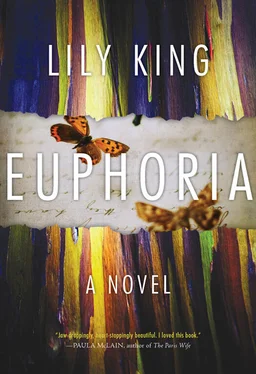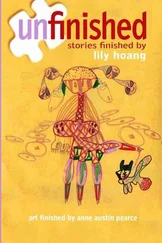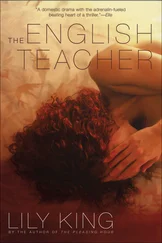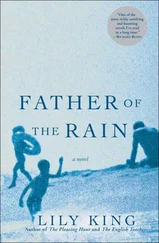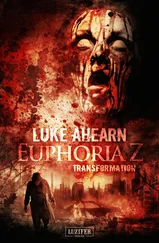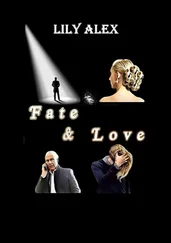Initially I was supposed to find a tribe on the Sepik River of the Mandated Territory of New Guinea, an area which had yet to be penetrated by missionaries or industry. But when I arrived in Port Moresby I was told that the region wasn’t safe. There had been a spate of headhunting raids. So I went to the island of New Britain where I studied the Baining, an impossible tribe who refused to tell me anything until I learned their language and when I had learned their language still refused to tell me. They would direct me to some person a half day’s walk away and when I returned I would discover they’d held a ceremony in my absence. I could get nothing out of them and even after a year I hadn’t figured out their genealogy because of a plethora of name taboos, which prevented them from ever saying aloud the names of certain relatives. But it must also be said that I had no idea what I was doing. For the first month I went around measuring their heads with calipers until someone asked me why and I had no answer apart from having been instructed to do so. I chucked the calipers away but never really understood what I was meant to be documenting instead. On my way home, I stopped in Sydney for a few months. Haddon was teaching at the university and he took me on as his assistant for his ethnography classes. In my spare time I worked on a monograph about the Baining. After he read it, Haddon claimed I was the first person to ever admit to having limitations as an anthropologist, to not understanding the natives when they conversed among themselves, to not having witnessed the full-blown version of a ceremony, to being duped and tricked and mocked. He was taken by my candor, but for me to have pretended otherwise would have been chicanery, like poor Kammerer injecting India ink into the feet of his midwife frogs to prove Lamarck’s inheritance theory that characteristics acquired after birth can be passed on. At the end of the semester, I took a brief trip up the Sepik with my students to see a tribe or two, just to see what I had missed by not going there initially. I was quite taken with the Kiona, if only because when I asked a question through a translator, they answered it. We stayed four nights, and a week later I returned to England.
I’d been gone three years. I thought that might be enough travel for a while, but the combination of the winter gloom, my mother’s restless bullying, and the stale cerebral self-conscious wit that bubbled like a frothy mold in every corner of Cambridge drove me to return to the Kiona as fast as I could manage.
My village of Nengai lay forty river miles west of Angoram. As the crow flies it would have been half that, but the Sepik, the longest river in New Guinea, is flamboyantly serpentine, the Amazon of the South Pacific, with a tendency to meander to such extremes that it has created, I learned a decade later under much different circumstances, over fifteen thousand oxbow lakes, places where the loops bent around so far they broke off. But when you are in a dugout canoe at night, even if it is motorized, you are not cognizant of the inefficient zig and zag of your route. You simply feel the river bend one way and then eventually another. You get used to the bugs in your eyes and mouth and the shiny rucked bulges of crocs and the monkeys caterwauling on high branches and the thrash and bustle of thousands of nocturnal creatures gorging themselves while their predators sleep. You do not feel the extra, unnecessary twenty miles. If anything, you wish the trip were longer.
The thin moon gave the river a thin silver skin. As I had hoped, Nell nestled in among their bags and looked comfortable. I felt relieved when her eyes shut, as if she were my own croupy child who needed rest, and I puzzled over this feeling as Fen and I talked. We spoke not about our work but about Cambridge, where he’d been for a year while I was off with the Baining, and about Sydney, where we’d first met. We talked about football and Prime Minister MacDonald and India. The last I had heard, Gandhi had begun another hunger strike, but neither of us knew how it had ended. History hung suspended for months. I took solace in the not knowing.
After an hour or so of almost complete darkness on both banks, we came round a bend and saw fires and the flashes of festooned bodies all along a beach on the southern shore. It was the Olimbi village of Kamindimimbut, in the midst of a celebration. The smell of roasted boar reached us, and the hard drumming thudded in our chests.
It’s hard to believe, as I write this account, that the next World War was only six years away from that night, or that in nine years the Japanese would take control of the Sepik and the whole of the New Guinea Territory from the Australians, or that I would let the United States government shake me down for every bit of knowledge I had about the area. Would Fen or Nell have done the same? Anthropological contribution, they called it in the OSS. A generous epithet for scientific prostitution.
I led a rescue operation up the Sepik to this village at the end of ‘42, and afterward every man, woman, and child of Kamindimimbut was killed by the Japanese when they learned a few Olimbi men had helped us find the three captured American agents being held nearby. Over three hundred people slaughtered solely because I knew which cluster of raised houses, which strip of sand, was theirs.
‘What do you do about women then, Bankson?’ Fen said quite out of the blue, after we’d passed Kamindimimbut.
I laughed. ‘That’s a bit personal for our first canoe trip, isn’t it?’
‘Just wondering if you’ve gone Malinowski’s route. Sayers visited the Trobriands last year and said there were quite a number of suspiciously tan-colored adolescents walking about.’
‘Do you believe it?’
‘Have you seen the man in action? Nell and I picked him up at the station in New York and the only thing he said to me was “I need a martini in my hand and a girl in my bed.” Seriously, mate, it’s rough alone. I don’t think I could do it again.’
‘I’ll take a partner of some sort or other next time. More efficient, too, by half.’
‘Not sure I’d go that far.’ His spent cigarette made a brief orange arc into the river. I slowed for him to light another, then sped up again.
Sometimes at night it seemed to me that my boat was not being pushed by the engine but that boat and engine both were being pulled by the river itself, the ripples of wake just a design, like a stage set moving along with us.
‘Sometimes I wish I’d gone to sea,’ I said, perhaps simply for the luxury of being able to speak a passing thought aloud to someone who would understand what I meant.
‘Do you? Why’s that?’
‘I think I’m better on water than land. Better in my skin, as the French say.’
‘The ship captains I’ve met are tossers.’
‘It would be nice to do a job that wasn’t a big invisible knot to untangle, wouldn’t it?’
He didn’t answer, but I wasn’t bothered. I was flattered that we’d gotten to this stage already, that our minds could wander without apology. We passed through a long swath of fireflies, thousands of them flashing all around us, and it felt like soaring through stars.
The dark shapes on land became increasingly familiar: the tall narrow blackboard tree I called Big Ben, the jut of blueschist rock, the high mud bank of the most western Kiona hamlet. I must have slowed for Fen said, ‘Are we nearly there?’
‘Mile or two more.’
‘Nell,’ he said in a regular voice, not so much a question as a test. Satisfied she was still asleep he leaned over and said to me quietly, ‘Do the Kiona have a sacred object, removed from the village, something that they feed and protect?’
He’d already asked me many questions along these lines in Angoram. ‘They have sacred objects, certainly — instruments and masks and skulls of old warriors.’
Читать дальше
